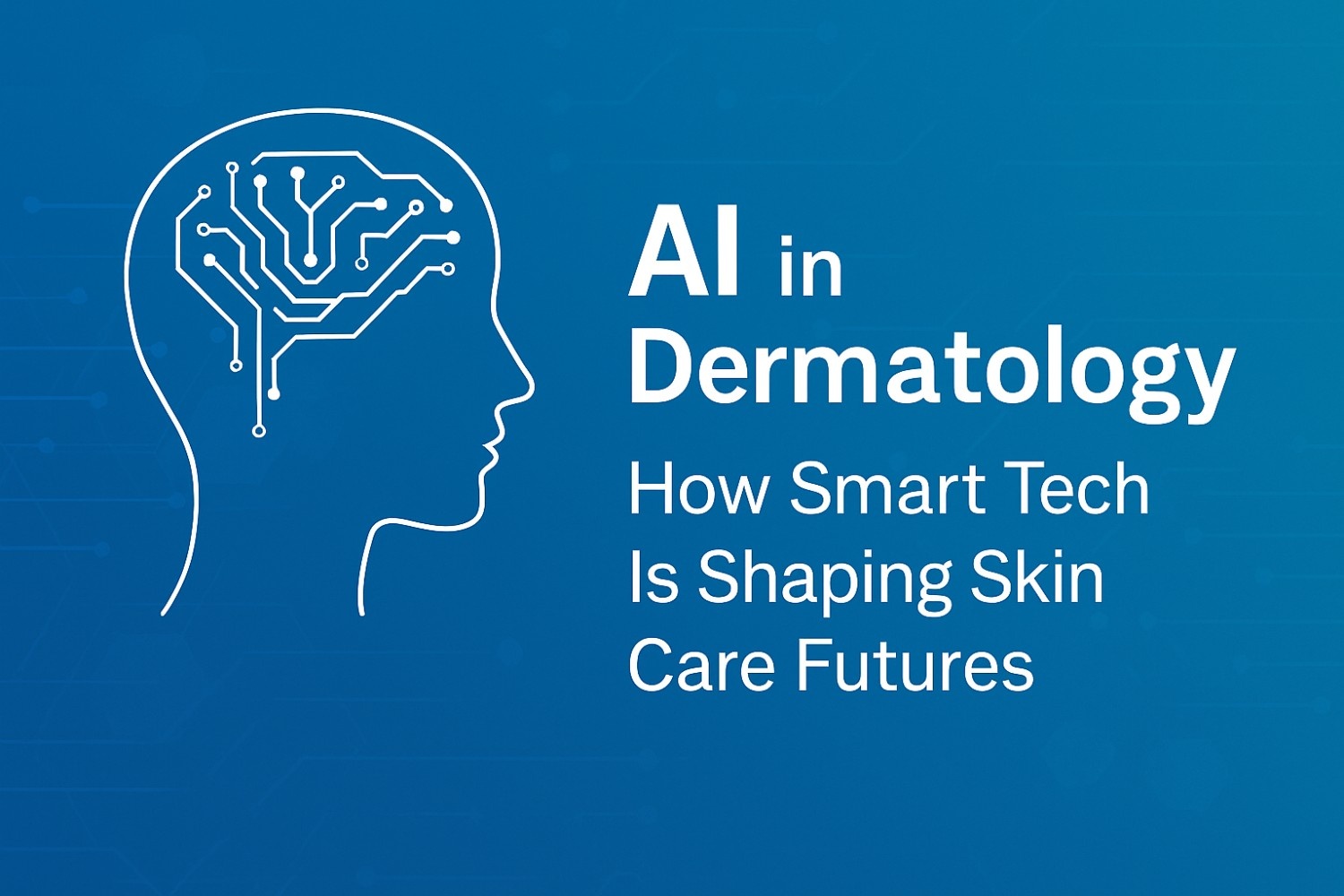
TVL Health •
TL;DR
Best for
Readers who want practical, step-by-step clarity.
Read time
5 min
In recent years, artificial intelligence (AI) has made significant strides in transforming industries across the globe — and dermatology is no exception. From early skin cancer detection to personalized skincare recommendations, AI is revolutionizing how dermatologists diagnose, treat, and monitor skin conditions of Dermacian. The convergence of machine learning, big data, and dermatological science is leading to faster, more accurate, and more accessible care for patients around the world.
In this blog, we explore how AI is reshaping the future of skincare and dermatology, with real-world applications, current limitations, and what this could mean for patients and practitioners alike.
Zoom image will be displayed
What is AI in Dermatology?
AI in dermatology typically involves machine learning algorithms trained on large datasets of medical images or patient records to identify patterns and make predictions. These AI systems can analyze skin lesions, rashes, acne, pigmentation, and more — often with accuracy comparable to or better than human experts.
Some applications include:
Automated skin cancer screening
Diagnostic support tools
Personalized skincare routines
Predictive models for treatment outcomes
Virtual consultations and triage systems
These tools don’t aim to replace dermatologists but rather to augment their capabilities, allowing them to focus on more complex cases and provide faster service.
How AI Is Changing Dermatology — Key Applications
1. Skin Cancer Detection and Diagnosis
Perhaps the most groundbreaking application of AI is in early skin cancer detection, especially melanoma, one of the most aggressive forms. Algorithms trained on thousands of dermoscopic images can now:
Classify lesions with remarkable accuracy
Differentiate between benign and malignant spots
Flag suspicious moles for further examination
For example, Google’s AI model for skin conditions has shown a high level of diagnostic accuracy, rivaling that of board-certified dermatologists.
This technology is especially impactful in areas where dermatologists are scarce. A smartphone app powered by AI could provide life-saving alerts long before a person sees a doctor.
2. Virtual Dermatology & Remote Consultations
Teledermatology was already on the rise, and AI has supercharged its capabilities. Now, AI can pre-screen images, triage cases, and even suggest likely diagnoses before the dermatologist reviews the case.
For instance:
Patients upload photos of their skin condition via an app.
AI analyzes the image and matches it to known conditions.
The system ranks possible diagnoses and recommends next steps.
This allows dermatologists to see more patients virtually, prioritize urgent cases, and reduce wait times for in-person visits.
3. Personalized Skincare Powered by AI
AI is also being used to build customized skincare routines based on your skin type, concerns, and lifestyle. Platforms analyze:
Skin photos
Questionnaire responses
Environmental data (pollution, UV index, humidity
Then, they suggest:
Best skincare ingredients
Product recommendations
Routine schedules
This level of personalization used to be available only through dermatologist consultations — now it’s accessible to anyone with a smartphone.
4. AI in Acne & Pigmentation Treatment
AI tools are being trained to:
Classify acne severity
Track improvements over time
Suggest optimal topical or oral treatments
For pigmentation issues (like melasma or post-inflammatory hyperpigmentation), AI can:
Analyze skin tone and discoloration
Recommend treatment plans
Alert users to products that may worsen pigmentation
By creating standardized, data-backed treatment protocols, AI reduces trial-and-error treatment and improves patient outcomes.
5. Clinical Research & Data Analysis
AI helps researchers analyze large datasets to:
Predict how patients will respond to treatment
Identify rare side effects early
Discover new treatment pathways
AI models are also helping clinical trials become more efficient by:
Selecting ideal trial participants
Monitoring side effects in real-time
Analyzing effectiveness more quickly
Real-Life Example: AI Skin Check Tools in Action
Let’s take a look at an example to see how this plays out.
Scenario: A patient notices a strange mole on their shoulder but doesn’t want to visit a dermatologist just yet.
They download an AI-powered skin scan app.
They take a clear photo of the mole.
The AI flags it as “potentially malignant.”
The app urges them to book a consultation.
The dermatologist reviews the flagged lesion and confirms early-stage melanoma.
Outcome: Early diagnosis, successful treatment, and potentially a life saved — all thanks to AI triage.
Limitations & Ethical Considerations
Despite its potential, AI in dermatology isn’t perfect. Here’s what to watch out for:
1. Bias in Training Data
If an AI system is trained mostly on images of lighter skin tones, it may misdiagnose conditions on darker skin. Efforts are ongoing to build more inclusive datasets, but this remains a concern.
2. Misdiagnosis Risks
No AI tool is 100% accurate. There’s a risk of false positives or negatives, especially when lighting, image quality, or skin care type varies.
3. Privacy & Data Security
AI requires large amounts of data, often including sensitive images and health information. Companies must ensure compliance with data protection laws (like HIPAA and GDPR) and guard against misuse.
4. Regulation & Oversight
AI tools must undergo rigorous testing and FDA or equivalent regulatory approval before being used clinically. Many tools are still in the early stages of validation.
The Future of AI in Dermatology
The next few years could bring:
Voice-activated diagnostic tools integrated into wearable devices
AI-assisted robotic dermatologic surgeries
Genomic AI mapping to tailor treatments based on DNA
Augmented reality (AR) to simulate post-treatment results
AI won’t replace dermatologists — but it will change how they work, enhancing precision, accessibility, and efficiency in ways we’re just beginning to imagine.
Final Thoughts: A Smarter Skin Care Era
AI is not a futuristic fantasy — it’s happening now. For dermatologists, it’s a powerful ally in diagnosis and decision-making. For patients, it’s a tool for empowerment, offering fast, accessible insight into skin concerns.
At Dermacian, we’re watching these developments closely and are committed to integrating the best of modern dermatology with emerging technologies. Whether it’s through smart diagnostics, advanced laser treatments, or personalized skincare advice, the future of skincare is intelligent — and it’s here.
Need expert advice for your skin?Book a consultation with a certified dermatologist at Dermacian.com and explore treatments tailored to your unique skin profile.
You may also like
More from this category.

Category
Diamond Tops vs. Gold Tops: Which One Is the Better Choice?

Category
Small Wedding Venues California: Intimate Spaces for Unforgettable Celebrations

Category
Les Meilleurs Casinos en Ligne en France : Comment Bien Choisir

Category
Photo-Ready Afro Curls the Soft-Focus Curl Look with Piano Color Dimension

Category
Non-Surgical Hair Loss Treatments: Effective Options for Men and Women

Category
Casinò Non AAMS 2026: Guida Completa a Sicurezza, Bonus e Pagamenti Rapidi

Category
Casinò Non AAMS: Guida Completa al Gioco Online Sicuro e Internazionale

Category
Meilleur Casino en Ligne en France : Guide 2026

Category
Les Tendances des Casinos en Ligne en France en 2026

Category
Complete Guide to Buying Best Bluetooth Earphones Malaysia
Tip: swipe to explore more.
